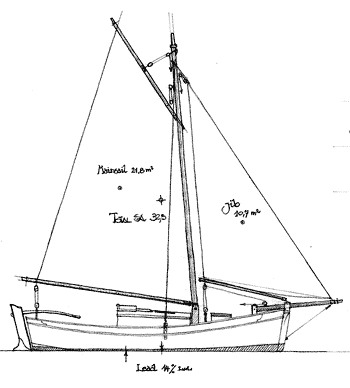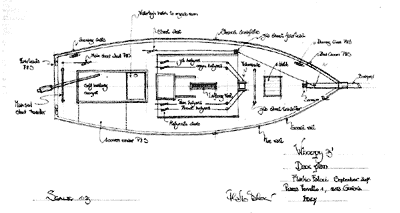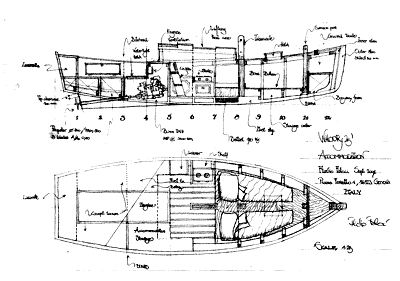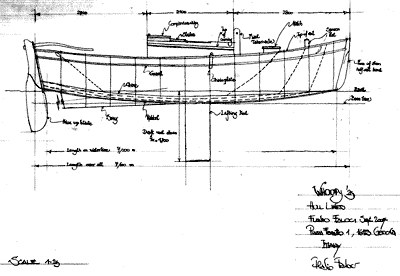| 
click images for larger view
Length Overall |
- |
7,60m - 24' 11" |
Beam |
- |
2,50m - 8' 2" |
Draft (keel up) |
- |
0,31m - 12" |
Draft (keel down) |
- |
1,70m - 5' 6" |
Sail Area |
- |
32,5m2 - 349 sqft |
Weight |
- |
1384kg - 3,048lbs |
Max Load |
- |
525kg - 1,156lbs |
Ballast |
- |
387kg - 852lbs |
Engine |
- |
Bukh DV7 ME - 7HP |
Whoopi is a small "modern classic"
daysailer designed for th eClassic Boat 2007 design
competition - "A Boat for Grandad Jack".
The requirements
were published in the April, 2007 issue. To the basic
design requirements I have added a few more points
in order to focus on a boat very simple to build and
sail.
The boat can be used for:
- Daysailing - locally exploring
estuaries and beaches
- Overnight Cruising - camping
on board, anchored
- Racing - Yacht club weekly race
for classic boats
Her length has been selected to take advantage of
max allowed dimensions for the under 25' class (7,600m);
designing short overhangs a LWL around 7 meters has
been achieved.

A maximun beam of 2,500m has been chosen to meet
the rules for trailering as well as for best use of
4 x 8 plywood sheets.
A bit more than one meter of hull depth seems to
be the best compromise betwen internal accommodations
adn low hull windage.
Aiming at exciting surfing performance, the maximum
length/displacement ratio has been fixed at 150. For
a waterline length of 7 meters, the loaded displacement
should not exceed 1900kg.
For good upwind performance, a sail area to displacement
ratio of around 15m2/ton has been chosen. In the interest
of light weather performance, the coefficient of sail
area to wetted surface exceeds 2.20. The sail area
will be around 30m2. For outstanding downwind performance,
a 50m2 asymmetric will make ten knots possible.
A V-bottom hull has been selected for its simplicity
and as a nice side effect, a hard chine aft will help
high speed planing performance. Hull deadrise and
rocker have been optimized for a Froude number FN=0.32
(or -in other words - between five and six knots),
aiming at a prismatic coefficient of 0.54, and a longitudinal
center of buoyancy (LCB) between 2 and 3% aft of amidships.
Topsides flair has been shaped for the best compromise
waterline beam, reaching a good balance between reduced
hull wetted surface adn good stability sailing. A
nice sheer has been sketched for good looks as well
as a drier bow.

The basic layout is simple. The cockpit is long (2,400m)
enough to provide - with a tent over the boom - extra
sleeping space should it be needed. The footwell floor
is well above the load waterline and it will be self
draining. The deck house is low with an average width
of 1,5m. The cabin is very simple with room for two
to sleep and live. Locker space is provided under
the bunks and under the forward deck.
The rig is simple and easy to build and manage. A
solid mast without spreaders will be fitted. A gaff
mainsail and a self tending jib will be the standard
rig for cruising. An Asymmetric spi and an overlapping
genoa shall be hoisted for racing.

The keel slides up and down in a case which is open
at the cabin top. The rudder tilts easily with aq
cord that runs to a cleat on the wooden long tiller.
There are three reasons for using kick up appendages:
- The boat can be easily loaded on a trailer
- Raising keel and rudder she can be left on
a tide mooring
- The keel can be build as a steel box, filled
with lead nd faired with wood (easy and cheap)
Keel to sail area ratio is around 3% - typical of
modern fast daysailers. Maximum draft with teh keel
down is about 1.7m - a bit more than the average for
this size boat. There is additional internal ballast
under the cabin sole around the keel case.
Teh hull is traditionally build using marine plywood
and dimensional wood (Douglas Fir). Everything on
board has been nailed or screwed - there is no epoxy;
no stitch and tape.
The engine is a Bukh DV ME - so rugged that it is
one of the most used on lifeboats. With 7 horsepower
it shold be able to push Whoopi at almost 7 knots.
I built a 20:1 model of Whoopi.

See
Flavio's entry to our Design Contest #6 - Dodo

|